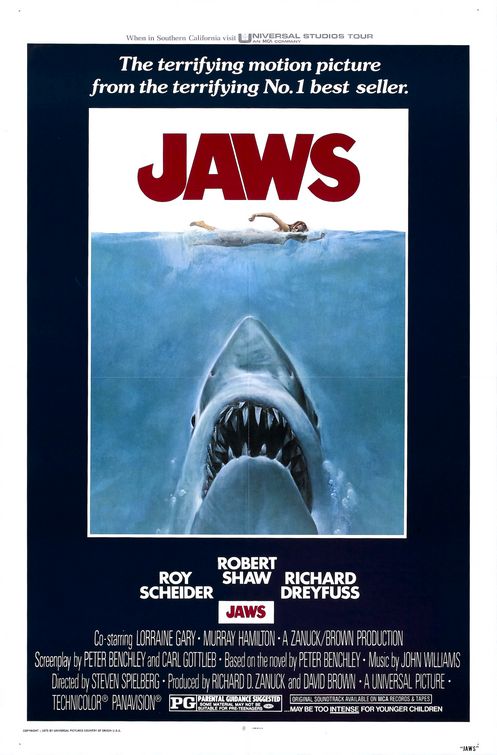
JAWS, released in the summer of 1975, has enjoyed 39 years of great-white supremacy. 39 years, and not a single legitimate challenger to the throne. What’s the last watchable great-white-shark movie to be released into theaters and truly strike a chord with movie lovers? There really, really aren’t many to even consider.
DEEP BLUE SEA? Those are makos, my friend.

OPEN WATER? Promising, but too modest, and ultimately unsatisfying. (Too much water, not enough shark.)

THE REEF? Pretty good actually, but also too shallow as far as cultural resonance reaches.
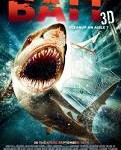
BAIT? Solid enough but ain’t gonna change your life.

SHARK NIGHT 3D? Be serious now.

DARK TIDE? Nobody besides me has even seen this one and that includes Halle Berry.

Of course I’m discounting ten years of SyFy movies like SHARKNADO (I may watch them but I’ll not rate them here) and, more conspicuously, the three JAWS sequels, but I’m fairly sure that the point is already made:
Serviceable.
In need of major service.
A wreck.

SO in addition to being the tremendous and influential box-office success that it was immediately upon release in the summer of 1975, JAWS is an uncontested champion in its genre. In fact, the genre field is as limited as it is because of JAWS. Everybody and their inbred Mormon cousin thinks they can take a crack at a vampire movie or a zombie movie, but few dare to jump in the pool of great-white-shark movies. And the only reason is that almost everyone with half a brain cell knows that their attempt will be unfavorably compared. The original JAWS is just plain that good a movie.
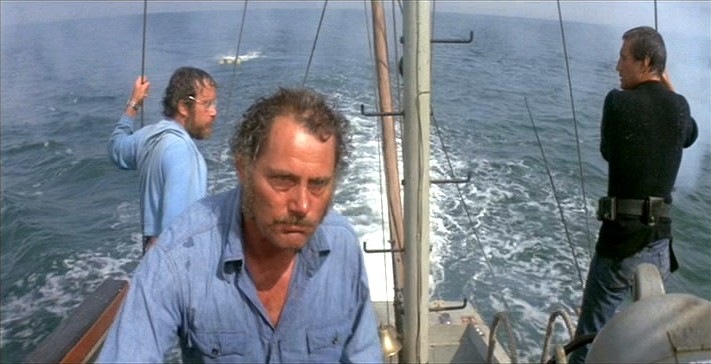
When I listed JAWS as one of the 13 movies every horror fan should see, I brought up the question of whether JAWS really does count as a horror movie. A great white shark is a very unlikely threat, especially as it behaves in this movie, but it obviously isn’t a supernatural one. There are great white sharks out there — though unfortunately, less and less of them every day. There are great white sharks, and in exceedingly rare circumstances, they have been known to bite people. (I recommend this account, concerning the true events that partially inspired JAWS.) But as large as its imagery still looms in the public imagination, JAWS is heavy fiction. You’re in greater danger from your next-door neighbor than you ever are from a great white shark, a fact many horror movies happily exploit. Peter Benchley and Steven Spielberg have both admitted to profoundly ambiguous feelings over JAWS being a smear job against sharks.

But what I’m getting to is a point I made much more concisely in my list of thirteen — that point being, that some fears lock into us on a primal level. There’s not much need for humanity to fear great white sharks, but on a basic, molecular, evolutionary level, both literally and figuratively, we’re all afraid of what we can’t see. We’re all afraid of being eaten. We can feel superior to animals all we want to, but when you come right down to it, in our basest instincts — we’re them. We rarely admit it, but we know it. People are animals, and all animals are food for somebody. JAWS speaks directly to this fear, way more than pretty much any other big-name monster movie. King Kong and Godzilla, The Wolfman and The Creature From The Black Lagoon, The Predator and The Alien and anyone else coming to mind; all of them might have teeth to bare at you, but ain’t none of ‘em known to swallow a man whole. That, I argue, is why JAWS still remains at the top of the horror-movie food chain. It’s a 39-year-old movie, so as effects and film stocks have changed it can’t help but have lost some of its potency, but it’s the rare 39-year-old movie that retains so much of that original impact.

So yes, JAWS, is a horror movie. Just think of all of its tremendous horror moments — that opening skinny-dipping attack (its exploitation of the vulnerability we feel when nude subtly drawing a line to PSYCHO); the ominously-dim scene where the two fishermen cheat death (“Take my word for it and don’t look back!“); the daytime death of Alex Kintner and how it corroborates Chief Brody’s every last fear; the William Castle jump-scare that is the discovery of Ben Gardner’s boat; that horrible, almost slow-motion moment in the estuary when we finally get to see those titular jaws, right as they’re closing around a man; the ingenious conceit of the yellow barrels as an indicator of danger; the brilliant tonal pivot that is Quint’s Indianapolis speech; and so on.

The genius of JAWS, and what director Steven Spielberg and his writers (including Carl Gottlieb, Howard Sackler, and John Milius) and composer (John Williams) and cinematographer (Bill Butler) did with Peter Benchley’s book, was not only that they managed to wring every last horror moment out of the killer-shark scenario, but also the way that they welded it onto the American nautical-adventure tradition that goes all the way back to Melville’s Moby Dick but also includes all of the swashbuckling pirate movies of the 1940s, with the unlikely Roy Scheider and Richard Dreyfuss standing in for Errol Flynn.

There are genuinely rousing moments in that final third of JAWS, when Robert Shaw is barking out orders from the bow of the Orca, that feel like the horror is at our backs and we’re chasing the big fish. These moments of the movie make Spielberg’s subsequent INDIANA JONES films feel like a natural artistic progression (which they are). It’s the basis of Spielberg’s phenomenal career — that he can juggle genre so effectively even within a single movie. He’s modern cinema’s foremost utility player: He can find the horror moments in an action film, or a sci-fi, or even a historical drama, and he can balance all those with moments of comedy and pathos and big ideas and spectacle, and in the smooth transitions lies the key to why his movies work so well for so many people.
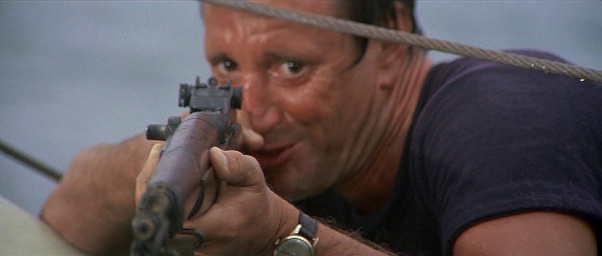
JAWS was a miracle moment for movies, where great writing and filmmaking (and perfect performances from Scheider and Shaw) all collide with a perfect premise, and together manages to brush up against the feel of myth. Even the cynics recognize it as a pivotal film in American culture. It’s a movie so mythic in our collective mindzones that even the behind-the-scenes stories remain endlessly fascinating to a legion of film fanatics — myself very obviously included.

JAWS is playing tonight at 7:30 at BAMcinématek and at midnight at the IFC Center.
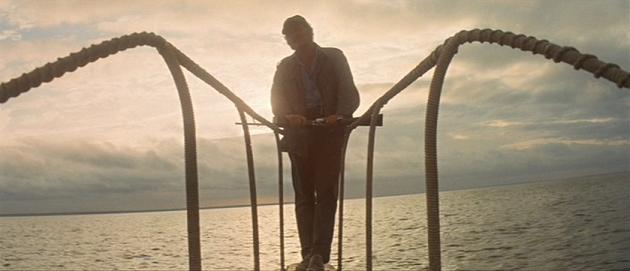
– JON ABRAMS.
@JONNYABOMB
- [THE BIG QUESTION] WHAT’S YOUR FAVORITE FEMALE ENSEMBLE IN MOVIES? - July 22, 2016
- [IN THEATERS NOW] THE BOY (2016) - January 24, 2016
- Cult Movie Mania Releases Lucio Fulci Limited Edition VHS Sets - January 5, 2016
Tags: Carl Gottlieb, Horror, Howard Sackler, John Milius, John Williams, Richard Dreyfuss, Robert Benchley, Robert Shaw, roy scheider, Sharks, Steven Spielberg

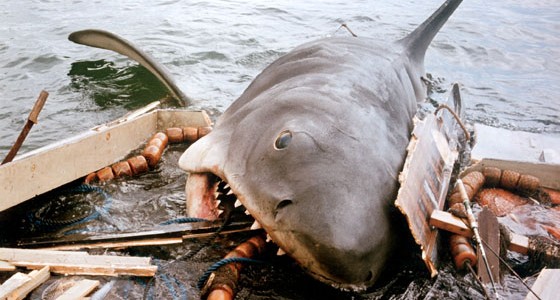








No Comments